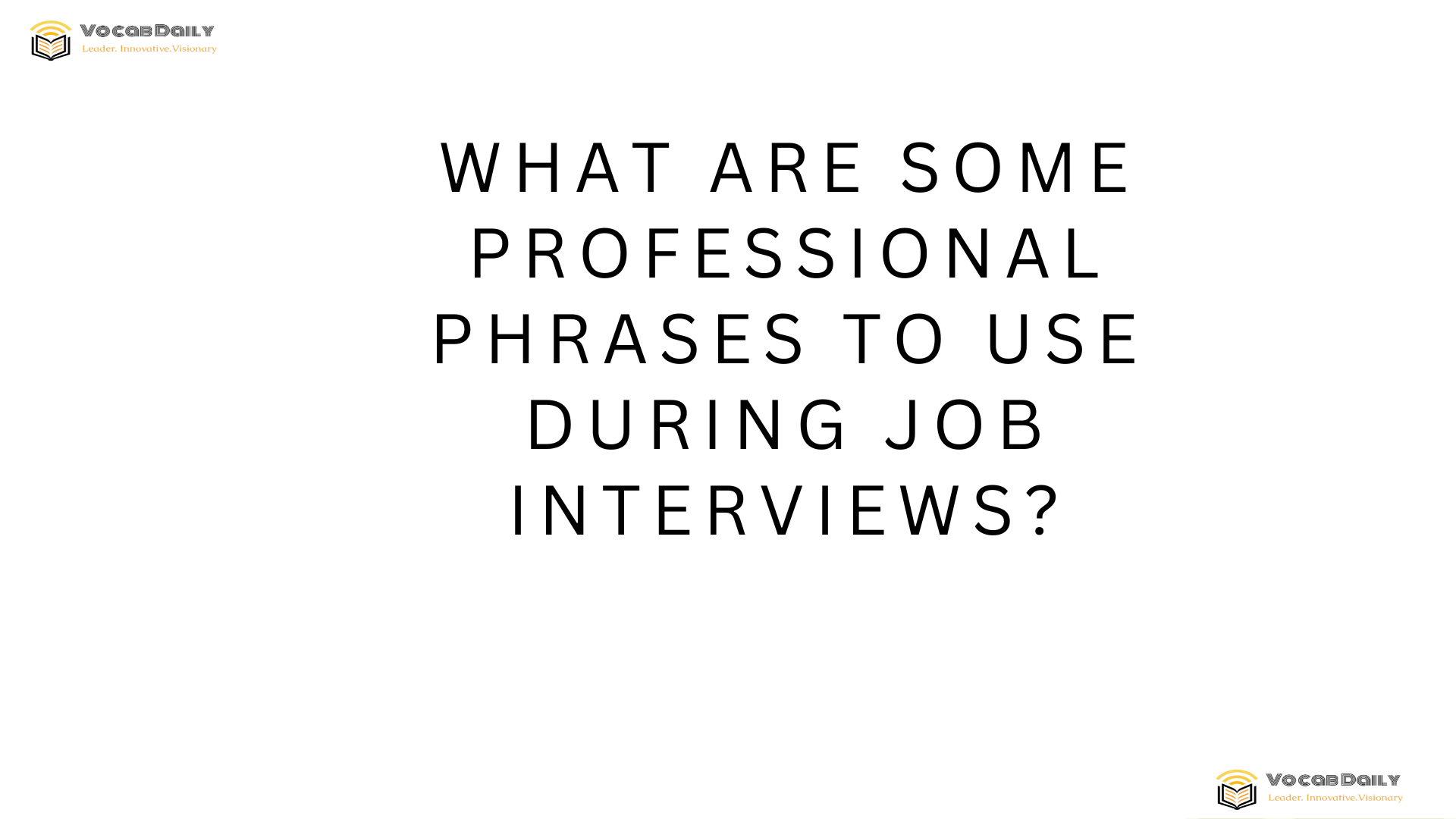What are some professional phrases to use during job interviews
Expressing Enthusiasm and Interest
One of the keys to a successful job interview is demonstrating genuine enthusiasm about the role and the company. Using professional yet positive language sets a confident tone and shows you are engaged. Phrases like “I am very excited about the opportunity to contribute to your team,” or “I have been following your company’s growth and am impressed by your innovation,” help convey this interest effectively.
Another useful phrase is “This role aligns perfectly with my career goals,” which links your aspirations to the company’s needs. Saying “I appreciate the chance to discuss how my skills can add value here” also demonstrates your readiness to contribute. These statements not only express interest but also signal professionalism and readiness.
Describing Your Skills and Experience
When discussing your qualifications, it is important to use clear and precise language that aligns with the job description. Phrases such as “I have extensive experience in…” or “My background includes successful projects involving…” help you highlight relevant skills while showcasing confidence.
Instead of simply saying “I worked on,” try using “I led” or “I managed” when applicable, as these verbs indicate leadership and responsibility. For example, “I managed a team of five to implement a new software system” sounds more impactful than “I worked with a team.” You can also say, “My skills in [specific area] enable me to handle challenges efficiently,” which draws direct connections between your talents and the job requirements.
Answering Questions About Challenges
Interviewers often ask about how you handle obstacles or learn from difficult experiences. Using professional phrases to describe these situations can demonstrate your problem-solving abilities and resilience without sounding negative. Phrases like “I view challenges as opportunities to grow,” or “I approach problems with a solution-oriented mindset,” establish a positive attitude.
When describing a specific case, you could say, “In my previous role, I encountered a situation where… I took the initiative to… which resulted in…” This format shows that you take ownership and achieve results. Avoid sounding defensive by replacing “I didn’t” with “I made sure to,” focusing on proactive actions instead of mistakes.
Expressing Teamwork and Collaboration
Professional environments highly value teamwork, so highlighting your ability to collaborate effectively can make an excellent impression. Use phrases like “I enjoy working in a team setting because it fosters diverse perspectives and creative solutions,” or “I prioritize clear communication to ensure alignment within the team.”
When referencing past experiences, you might say, “I collaborated with cross-functional teams to achieve project goals,” or “I facilitated meetings to coordinate efforts among different departments.” Such phrases emphasize your interpersonal skills and your capacity to contribute constructively to group efforts.
Discussing Your Strengths and Weaknesses
Talking about your strengths professionally involves confidence without arrogance. Phrases like “One of my key strengths is my attention to detail,” or “I bring strong analytical skills that help in data-driven decision-making,” sound focused and reflective.
When addressing weaknesses, it is best to frame them as areas of growth with proactive solutions. For example, “I have been working on improving my public speaking abilities by attending workshops,” or “I recognize that I can be overly detail-oriented, so I am learning to balance precision with efficiency.” This approach demonstrates self-awareness and a commitment to continuous improvement.
Inquiring About the Role and Company
Asking thoughtful questions at the end of an interview shows that you are genuinely interested and helps you gather important information. Professional questions might include, “Can you tell me more about the team I would be working with?” or “What are the key challenges the company is currently facing in this department?”
You can also inquire about growth opportunities by saying, “How does this role contribute to the company’s strategic goals?” or “What professional development programs are available for employees?” These questions reflect your long-term interest and proactive mindset.
Closing the Interview Professionally
Ending the interview on a positive note leaves a lasting impression. You can say, “Thank you for the opportunity to discuss how my experience aligns with your team’s needs,” or “I look forward to the possibility of contributing to your company’s success.”
Expressing appreciation is also important: “I appreciate the time you’ve taken to speak with me today.” Lastly, indicate your interest in next steps with phrases such as, “Please let me know if you need any additional information from me,” or “I am excited about the possibility of joining your organization and contributing to its growth.” These statements convey professionalism and eagerness without being pushy.
Common Interview Phrases for Specific Scenarios
Certain interview questions require tailored responses. For example, when asked about handling tight deadlines, you might say, “I prioritize tasks effectively and maintain open communication to deliver on time.” For behavioral questions, using the STAR method (Situation, Task, Action, Result) works well. Phrases like “In a previous project, I faced…,” followed by “My approach was…,” add structure and clarity.
If asked about leadership experience, say “I take a collaborative leadership style that motivates and empowers team members.” When discussing adaptability, try “I am comfortable working in dynamic environments and adjust quickly to changing priorities.” These tailored phrases enhance your answers by matching your vocabulary to the scenario.
Tips for Using Professional Language Naturally
While using professional phrases is beneficial, it is important to sound authentic and not rehearsed. Practice your responses but avoid memorizing them word-for-word. Instead, understand the core message and adapt the phrase naturally during conversation.
Be mindful of your tone and pace; speak clearly and confidently but stay relaxed. Using professional vocabulary paired with genuine enthusiasm and engagement will make your answers more memorable. Remember to listen carefully to questions and tailor your responses thoughtfully rather than rushing through prepared lines.
Also check out VocabDaily workbook collections.

Leave a Reply